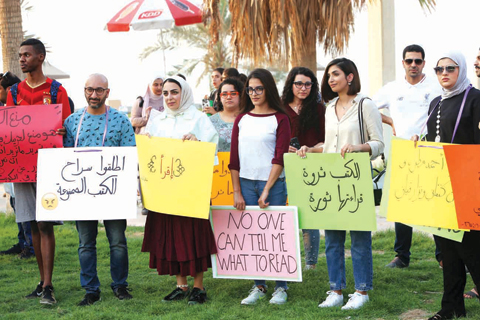KUWAIT: The information ministry banned 4,000 books from 2013 to 2017, some over religious sensitivities or political reasons, and others for violent or explicit content. People in Kuwait enjoy freedom of speech and have a great sense of pride about it compared to other Gulf and Arab countries, apart from Lebanon and Tunisia. However, academics, amateur researchers and the average book enthusiast have felt this special Kuwaiti literary pride has been damaged over the past few years.
Yesterday, protesters wore black blindfolds and held up placards expressing their opinions about what they think is an excessive banning of books. Kuwait Times interviewed some of these protesters, including Adnan Al-Abaar, a highly-educated Kuwaiti; Dr Fatima Al-Matar, who was very enthusiastic about this issue; Zahra Al-Qattan, a young Kuwaiti woman with a cheerful attitude despite her challenging health condition; and Eman Al-Salam, a trilingual Kuwaiti.
Kuwait Times: Why do men and women feel the need to protest against the banning of books?
Abaar: Because it's encroaching on our freedom to read ideas that might oppose ours, and we consider this as a belittlement of our minds and intellects, and it further reduces our liberties.
Moreover, it jabs at the notion that we are able to choose for ourselves which books we want to read, should read, and ultimately, can read.
Matar: We are protesting today because of the unfair book banning and book censorship by the Kuwaiti ministry of information. There have been 4,370 books banned by the ministry on grounds that these books contain text that "might" influence youth against their religious beliefs, or "might" affect national security. Most books that are banned are novels.
Qattan: Mostly because I think Kuwaitis are not used to this idea of limited freedom, or having someone dictate to them what they should or shouldn't do.
Salam: Because they want to prove that they have freedom of choice, and choosing books is one of its forms.
KT: Is the ministry making a mistake by being overly protective?
Matar: In my opinion, yes. In this day and age, banning books is fascist. The ministry has no right to dictate what we can and can't read. The Kuwaiti constitution gave us freedom of choice, freedom of opinion and freedom of thought.
KT: What does this ban symbolize?
Abaar: In the simplest sense, it symbolizes tyranny. If someone bans any book without providing sufficient evidence to justify it, and at least without a discussion through which we can argue against these reasons, then they are basically telling us that the bans are arbitrary and capricious.
Qattan: For me, it symbolizes totalitarianism. Kuwait is a democratic country according to the constitution.
Salam: Restriction of ideas and freedoms. I am advocating age restrictions when buying books.
KT: Do you want parliamentarians to take action?
Abaar: Of course! That's why Dr Fatima Al-Matar and I started the petition, which sends an e-mail of every signature to some of the people we have chosen. (You can help us by emailing me the names of parliament members and relevant decision makers and their email IDs, so I can add them to the petition.)
Matar: Members of parliament must take action. The media and publishing law no. 3 of 2006 puts too many "unconstitutional" limitations on what can and can't be published. This law cannot be amended unless MPs vote on it.
Qattan: We want MPs to STOP making decisions that limit our freedom and free will.
In conclusion, the protesters feel that the government should have more faith in them, and that this "overprotective motherly attitude" will only bring about weak-minded generations who cannot handle multiculturalism, or viciously unruly degenerates who will go head to head with anything religious or traditional for the mere vengeance for their freedom to read.
By Jeri Al-Jeri











